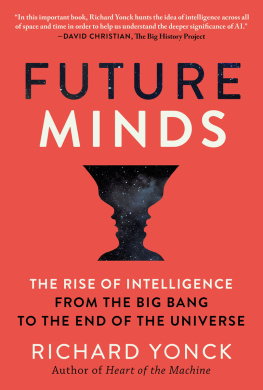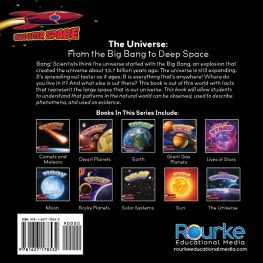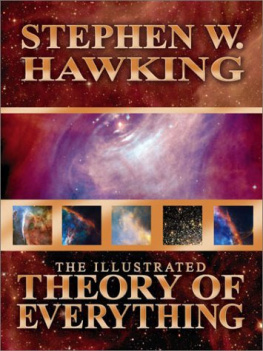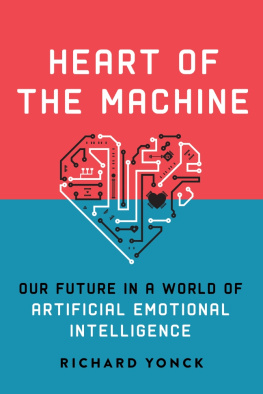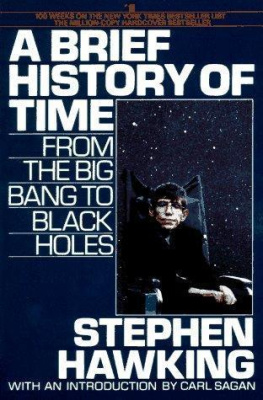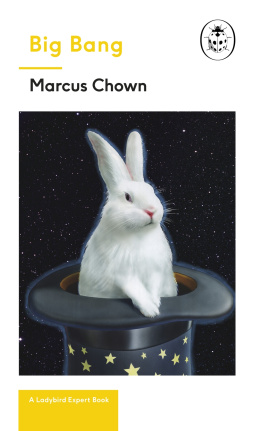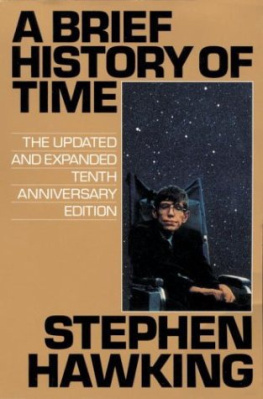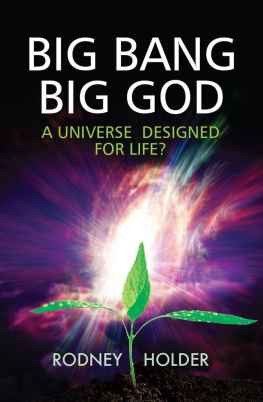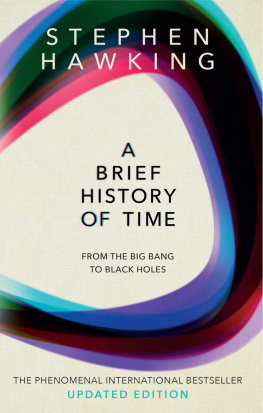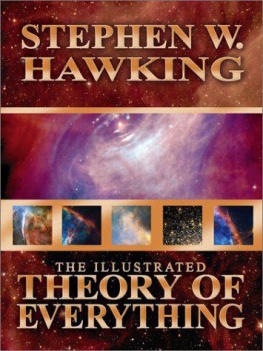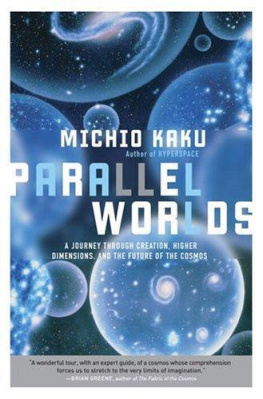

Also by Richard Yonck
Heart of the Machine: Our Future in a World
of Artificial Emotional Intelligence

Copyright 2020 by Richard Yonck
All rights reserved. No part of this book may be reproduced in any manner without the express written consent of the publisher, except in the case of brief excerpts in critical reviews or articles. All inquiries should be addressed to Arcade Publishing, 307 West 36th Street, 11th Floor, New York, NY 10018.
First Edition
Arcade Publishing books may be purchased in bulk at special discounts for sales promotion, corporate gifts, fund-raising, or educational purposes. Special editions can also be created to specifications. For details, contact the Special Sales Department, Arcade Publishing, 307 West 36th Street, 11th Floor, New York, NY 10018 or .
Arcade Publishing is a registered trademark of Skyhorse Publishing, Inc., a Delaware corporation.
Visit our website at www.arcadepub.com.
Visit the authors site at www.intelligent-future.com.
10 9 8 7 6 5 4 3 2 1
Names: Yonck, Richard, author.
Title: Future minds: the rise of intelligence, from the big bang to the end of the universe / Richard Yonck.
Description: First edition. | New York: Arcade Publishing, [2020] | Includes bibliographical references.
Identifiers: LCCN 2019050009 | ISBN 9781948924382 (hardback) | ISBN 9781948924405 (ebook)
Subjects: LCSH: Artificial intelligencePhilosophy. | Humanity.
Classification: LCC Q334.7 .Y66 2020 | DDC 006.301dc23
LC record available at https://lccn.loc.gov/2019050009
Cover design by Erin Seaward-Hiatt
Cover illustration: Sololos/Getty Images (cosmos); PeopleImages/Getty Images (womans face)
Printed in the United States of America
For my favorite intelligence in the universeAlex
Now is never just a moment. The Long Now is the recognition that the precise moment youre in grows out of the past and is a seed for the future.
Brian Eno
CONTENTS
PREFACE
We are all time travelers.
So many things make human intelligence unique. Our use of language and tools. Our ability to transform knowledge and concepts into entire sciences or schools of thought. Our refined motor skills that allow us to grasp everything from a soap bubble to a sledgehammer. But of all these wondrous abilities, none is so uncanny as our ability to travel through time. It is perhaps our greatest gift, and in so many ways it makes us what we are: Homo tempus, the time-traveling species.
You may think Im playing with words, because in the traditional sense, science assures us that time travel is impossible. In another, more mundane sense, everything moves along the arrow of time. Whether were talking about a rock, a rocking horse, or a rock star, all the universe passes through the seconds, minutes, and hours at the same metronomic pace. All of it consistently, in one unified direction, as we march to times unceasing beat.
But that is not what I mean at all, because we human beings are time travelers in the truest sense of the word, flitting from past to present to future and back again as effortlessly as a butterfly flutters from one flower to the next. This amazing capacity is a gift of our minds. With it, we are able to move from moment to moment with such ease and from such an early age that we rarely see this ability for what it truly is.
At times, it may seem as though our time-traveling skill is in charge of us rather than the other way around. Perhaps one moment were sitting in a monotonous business meeting, when suddenly we are transported to an event from our childhood decades before. Or maybe well be walking down the street as we relive a conversation from earlier that morning. The conditions arent important; the result is. Our minds let us wander effortlessly through this timescape, transcending the physical laws of the universe, allowing us to visit any place, any moment our memory and imagination want to deliver to us.
It is an astounding ability, this time-travel power of ours. It allows us to anticipate what is to come and to continue to grow and learn from the moments that have long since passed. Perhaps most importantly, it makes it possible for us to endeavor to build a futureideally our preferred future, where we hope to live one day.
Which brings us to the matter of this book about the future of intelligence, a book by and for time travelers. For this author, it is an opportunity to take a Big History view (which Ill explain momentarily), to jump about millions, even billions of years in the course of telling this story, which is thrilling beyond words. Having time-traveled this way all of my life, here is a chance to share the journey, to revel with others in the majestic beauty of our emergent and increasingly intelligent universe.
But if that were the only reason for this approach, our story would be little more than a travelogue, which I earnestly hope it is not. Instead, this book affords an opportunity to take the broadest of perspectives on intelligence, exploring the concept from a vantage that spans the bounds of the cosmos from the earliest instant to the end of all time.
In order to develop this Big History time-traveling view, Future Minds is organized into three sections. Deep Past covers the beginning of the Big Bang through the twentieth century and looks at how the laws of the universe have enabled the development and evolution of complexity, life, and intelligence and what this may mean for our future. Twenty-First Century explores the existing and anticipated developments in artificial intelligence, augmented human intelligence, and many other related areas. Finally, Deep Future extrapolates these developments and trends to speculate on the remaining 100 trillion years or more until the end of the universe. (I didnt want any epoch to feel left out!)
There will be those who take issue with some, perhaps many of the views that are presented here. Nevertheless, I believe we are at a stage in our evolution that necessitates we reinterpret and redefine that suitcase wordintelligence. Long before Ren Descartes wrote his famous cogito ergo sum, people pondered the nature of thought and experience, trying to understand just what these things we call intelligence and consciousness are. While this book can hardly promise a resolution to millennia of study, introspection, and conjecture, it will hopefully be a stimulus for ongoing discussion.
Finally, I want to underscore that this is not just any journey but a most human journey. Regardless of how far back we determine that intelligence originated, those earliest precursors eventually led to us. Similarly, however this thing we call intelligence develops, at least in our little pocket of the universe, we will have had a role in helping it get there. And who knows? Perhaps we are destined to be part of whatever that future of intelligence becomes. But if so, we should probably ask ourselves: What does the future hold that could be greater than our minds extraordinary ability to journey effortlessly through all of time and space? Perhaps we might find the answer in these words attributed to the incomparable Albert Einstein: Logic will get you from A to B. Imagination will take you everywhere.
DEEP PAST
Next page
